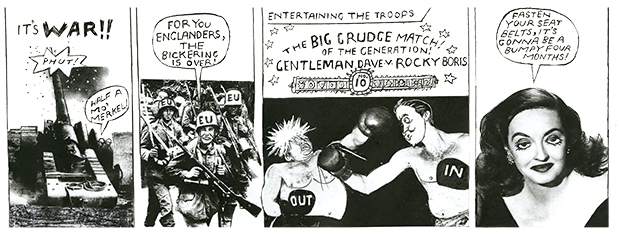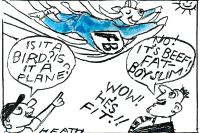Home
David Cameron, having continued talks through the night in Brussels, announced that he had achieved a ‘special status’ for Britain in the European Union and would call a referendum on it for 23 June. One concession he had wrung was that, for seven years, Britain could decide to limit in-work benefits for EU migrants during their first four years in Britain. ‘I do not love Brussels; I love Britain,’ he said. The cabinet met next morning, and six members left by a back door to promote their support for the campaign to leave. The biggest beast among them was Michael Gove, and the others were Chris Grayling, Iain Duncan Smith, Theresa Villiers, John Whittingdale and Priti Patel.
Boris Johnson’s face was on the front page of the main papers when he joined the ‘leave’ campaign. He suggested that a vote to leave might bring about reforms allowing Britain to stay: ‘There is only one way to get the change we need — and that is to vote to go; because all EU history shows that they only really listen to a population when it says no,’ he wrote in the Daily Telegraph. Mr Cameron kept saying that to leave the EU would be a ‘leap in the dark’. In a swat at Boris Johnson, sitting on a bench behind him, Mr Cameron told the Commons that he had ‘no other agenda than what is best for our country’. The number of Conservative MPs supporting an exit soon reached 130. The heads of 36 companies in the FTSE 100 signed a letter, organised by Stronger in Europe and Downing Street, backing the campaign to stay in the EU, but two thirds of FTSE 100 company heads did not sign.

Magazine articles are subscriber-only. Get your first 3 months for just $5.
SUBSCRIBE TODAY- Free delivery of the magazine
- Unlimited website and app access
- Subscriber-only newsletters







Comments
Join the debate for just £1 a month
Be part of the conversation with other Spectator readers by getting your first three months for £3.
UNLOCK ACCESS Just £1 a monthAlready a subscriber? Log in